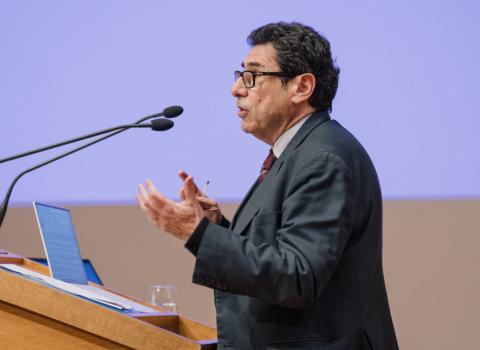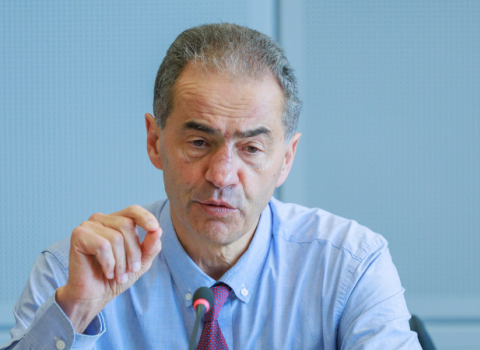The head of the EU’s most prestigious research funding body is once again campaigning to defend its autonomy

Maria Leptin, president of the European Research Council. Photo: European Union
European research and innovation policy will be undergoing a major restructuring in the coming years, and for Maria Leptin, president of the European Research Council (ERC), it’s not good news if the reforms result in less independence for the research funder.
In an interview with Science|Business, Leptin reminds policymakers that the autonomy and independence of the ERC is at the heart of its global success. The commitment to funding excellent science, rather than bowing to the political priorities of the day, helps generate ground-breaking, Nobel-winning science.
“The ERC has a significant degree of independence and autonomy, and I would say, that is the reason for its success,” said Leptin. “If there is any thought of curtailing that, that would be a disaster.”
Leptin made the comments after Science|Business published details of a leaked memo from the European Commission outlining a proposal to bundle all research and innovation funds, including the ERC and the European Innovation Council, into a new mega competitiveness fund starting in 2028.
The proposal is part of the early stages of negotiations for the next multiannual financial framework, which includes Framework Programme 10. While it sets down a marker, it is likely to be diluted during talks between the Commission, member states and the European Parliament.
According to one diagram in the leaked Commission memo, many EU programmes, including in research and innovation, lack “strategic steer”, with limited flexibility for reallocating funds as different needs arise, too many rules, gaps and overlaps, delays in access to funding and a lack of common governance.
To address this, the proposed reform envisions a single fund which would follow a “strong policy agenda” with a single rulebook covering eligibility rules and third-party participation, and with a single governance.
Leptin refrained from commenting on these unofficial proposals, but she is insistent the ERC model needs to be defended. “It's hard to comment on something that really doesn't have any detail, but we will reiterate our need for independence,” she said.
In contrast to the rest of Horizon Europe, where the Commission and member states set the agenda, ERC draws up its own work programmes, types of grants and budgets available for applicants. “It's the Scientific Council, and nobody else who sets that,” said Leptin.
The ERC has recently received high praise from the President of the Commission. In speeches in the Parliament and at the 70th anniversary of CERN last month, Ursula von der Leyen pledged to increase the budget of the ERC.
“We are, of course, extremely pleased to see that so many players have expressed strong support for expanding the ERC,” Leptin said.
Research lobbies have long been calling on the Commission to double the ERC’s budget.
The Commission’s expert group on FP10, led by Portugal’s former science minister Manuel Heitor, also says the ERC should keep its governance structure and independence from the Commission, and should have a much bigger budget after 2027.
Doubling the budget would only “stabilise” the ERC, said Leptin. “Bringing up our grants to compensate for inflation has never been done over 17 years, and funding all those projects that are rated A, that alone would probably eat up a doubling,” she said.
“There is strengthening, there is keeping its strength, and there is expanding,” said Leptin. She is looking forward to further make the case to the research commissioner-designate, Ekaterina Zaharieva and to von der Leyen's cabinet. “I'm very happy to engage and talk […] to the commissioner […], to von der Leyen's cabinet. And we certainly have lots of ideas that we could pursue.”
Changes are coming
The Heitor report, which will serve as a blueprint for the upcoming negotiations on FP10, calls for a a major overhaul of EU research and innovation funding, modelled on the ERC governance structure. That would see the European Innovation Council and two new councils – one on industrial technology and another on societal challenges – have the same autonomy.
The councils would be governed by an independent board of experts, and would set the direction for collaborative research and oversee the sector specific public-private partnerships.
For Leptin, the recommendations in the Heitor report are an acknowledgment of the ERC model. Scientists see ERC grants as prestigious and they flock to compete for them. That is because “we are able to do our processes and procedures in a way that serve the aim of excellence, that serve the scientific community, the applicants, and we have a process that will identify the best,” she said.
While the ERC model may well work for a future industrial technology council, it should be for the industry stakeholders to decide on their own procedures for pursuing excellence, rather than leaving it in the hands of officials in Brussels.
“That custom made process is what is meant by independence and autonomy, and that would work for industry,” Leptin said.





 A unique international forum for public research organisations and companies to connect their external engagement with strategic interests around their R&D system.
A unique international forum for public research organisations and companies to connect their external engagement with strategic interests around their R&D system.